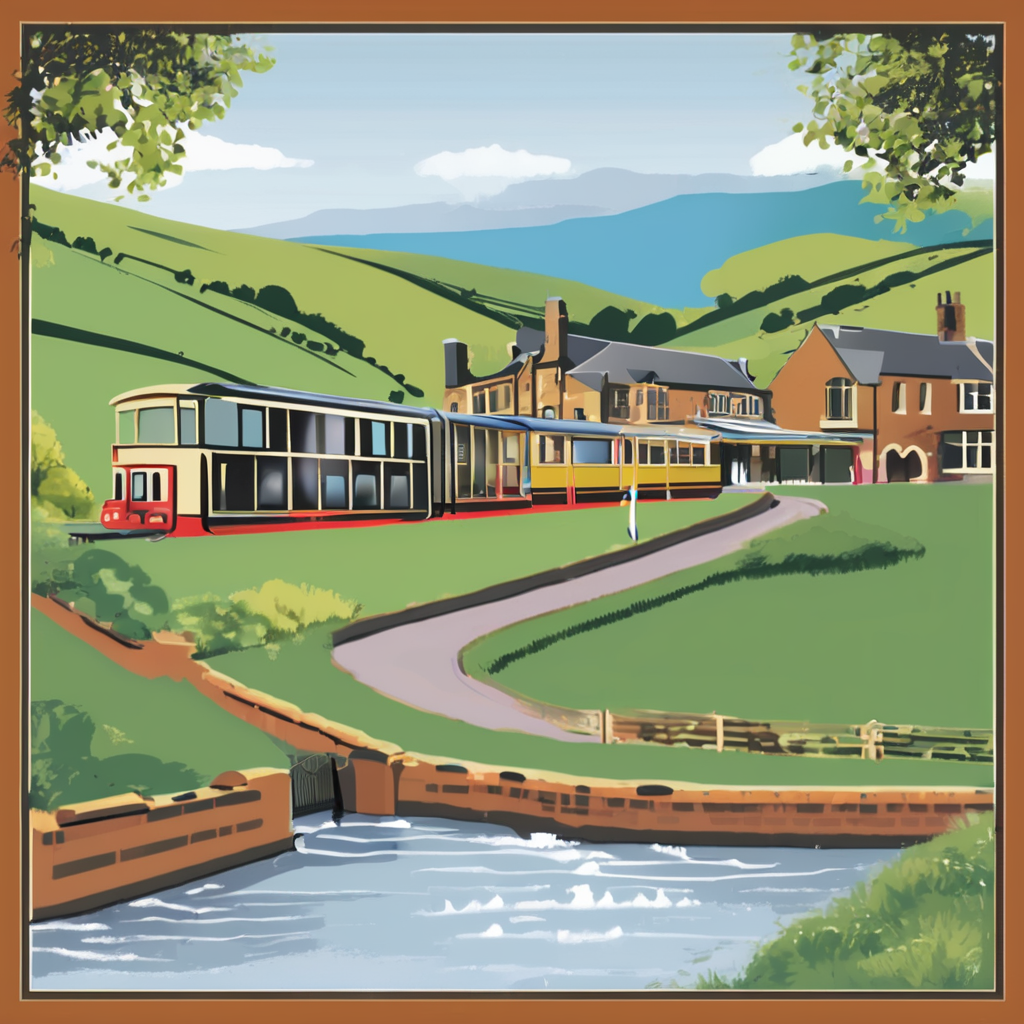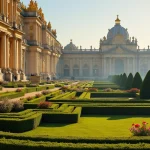Historical Landmarks and Rich Heritage
The United Kingdom history is deeply embedded in its numerous iconic landmarks and heritage sites that offer a window into the past. Ancient marvels such as Stonehenge and Hadrian’s Wall stand as testament to the enduring legacy of early civilizations in the region. Stonehenge, a prehistoric monument, is particularly famous for its enigmatic construction and alignment with celestial events, underscoring its significance beyond mere architecture.
Royal heritage is prominently displayed through landmarks like Buckingham Palace and Windsor Castle. These sites not only function as residences but also symbolize centuries of monarchy and national tradition. Buckingham Palace, the London residence of the reigning monarch, serves as a focal point for state occasions and royal ceremonies, while Windsor Castle, the oldest and largest occupied castle in the world, showcases medieval architecture and royal history.
Have you seen this : Versailles palace and gardens tour: exploring history, art, and grandeur
Additionally, the UK boasts numerous UNESCO World Heritage Sites, which carry global recognition for their cultural and historical value. These sites are preserved to maintain their authenticity and educate visitors about their importance within the broader tapestry of United Kingdom history. Their preservation efforts also contribute to tourism by offering tourists enriching experiences centered on historical discovery and cultural appreciation.
Together, these landmarks and heritage sites form an interwoven narrative that highlights the UK’s rich past, making it an essential destination for those interested in exploring history through tangible, well-preserved monuments.
Also to see : What Are Some Underrated Tourist Attractions in the UK?
Diverse Cultural Experiences and Arts
Discovering UK culture means immersing yourself in a vibrant blend of traditions, festivals, and artistic expressions that vary across the country’s regions. British traditions have deep roots and manifest uniquely through events like the Highland Games in Scotland and the Notting Hill Carnival in London. These celebrations offer visitors firsthand experiences of local customs, music, dance, and cuisine.
The art and theatre scenes in the UK are world-renowned. London’s West End remains one of the globe’s premier destinations for theatre, showcasing everything from long-running classics to cutting-edge new productions. Meanwhile, Edinburgh’s festivals, notably the internationally famous Fringe Festival, transform the city into a bustling hub of creative energy each summer.
Museums and galleries further enrich cultural experiences. The British Museum houses artifacts spanning millennia and continents, providing insight into human history globally and within the UK. Tate Modern offers contemporary art enthusiasts a dynamic collection set within a former power station, blending industrial heritage with modern creativity.
Together, these examples of UK culture, from lively festivals to prestigious art institutions, highlight the nation’s diverse offerings. They encourage travelers to engage deeply with the country’s artistic heritage and contemporary cultural life.
Famous Cities and Urban Experiences
Explore the best UK cities, each offering distinct urban attractions that capture the essence of the country’s rich tapestry. Tourism in London stands out as a global magnet thanks to its unparalleled mix of historic and modern landmarks. Iconic sights such as the Tower of London—an enduring symbol of British history—and Big Ben, the famous clock tower, draw millions of visitors annually. Beyond history, London boasts vibrant districts, shopping hubs, and world-class dining, making it a dynamic urban destination.
Edinburgh complements this with its historic charm and cultural vibrancy. Known for the Edinburgh Castle perched majestically atop Castle Rock, the city fuses medieval architecture with lively events such as the Fringe Festival, which transforms the city into an international arts showcase. This blend makes Edinburgh a must-visit city for those seeking both heritage and contemporary experiences.
Other cities like Manchester and Liverpool contribute uniquely to the UK’s urban appeal. Manchester is known for its influential music scene and sports heritage, while Liverpool offers rich maritime history and the legacy of The Beatles. These cities provide tourists with diverse cultural, musical, and sporting experiences that enhance the overall appeal of UK urban tourism.
Together, these urban centers highlight the range and depth of best UK cities for travelers, combining tradition, entertainment, and modern lifestyle in ways that keep visitors engaged and eager to explore more.
Natural Beauty and Scenic Landscapes
Experience the breathtaking UK nature through its diverse national parks and scenic countryside. Areas like the Cotswolds, Lake District, and Scottish Highlands showcase lush greenery, rolling hills, and dramatic mountain vistas. These regions are ideal for hiking, cycling, and wildlife watching, offering visitors a peaceful retreat from urban life.
The UK’s coastline also stands out with remarkable natural wonders. The Jurassic Coast, a UNESCO World Heritage Site, features cliffs rich in fossils and geological history, attracting both tourists and researchers. Similarly, the Giant’s Causeway in Northern Ireland presents unique basalt columns formed by ancient volcanic activity, providing stunning ocean views and a glimpse into natural history.
Outdoor enthusiasts benefit from well-preserved environments that support eco-tourism and recreational activities. National parks across the UK prioritize conservation while welcoming visitors, enabling a sustainable way to enjoy pristine landscapes. Whether exploring dense forests, tranquil lakes, or rugged coastlines, the UK offers a variety of natural settings that highlight its scenic beauty and ecological significance.
Culinary Scene and Gastronomy
Delving into the British food landscape reveals a rich tapestry shaped by centuries of regional influences and evolving tastes. The UK culinary experiences range from hearty traditional dishes like Yorkshire pudding and Cornish pasties to more sophisticated creations showcased in celebrated restaurants across the country. This diversity reflects the UK’s historical connections and contemporary openness to global flavors.
Regional specialities form a cornerstone of the local cuisine, providing distinct tastes that vary across England, Scotland, Wales, and Northern Ireland. For instance, Scottish smoked salmon and Welsh rarebit highlight local ingredients and time-honored recipes, while English cream teas offer a sweet reward that connects visitors to British customs. Understanding these variations enriches the visitor’s gastronomic journey by linking food with cultural identity.
Renowned pubs and eateries play a vital role in UK culinary experiences, offering settings where traditional and modern dishes coalesce. Afternoon tea, a quintessential British ritual, has been adapted into countless variations, each contributing to the distinct charm of the food culture. Moreover, the rise of food tours and culinary festivals across the UK invites tourists to engage actively with the local food scene, providing immersive and taste-driven encounters that complement historical and cultural explorations.
Ease of Travel and Accessibility
Navigating the United Kingdom is notably straightforward due to its comprehensive UK transport system. Extensive rail networks connect major cities and rural areas, providing fast and frequent services that enhance travel convenience. High-speed trains, such as those linking London to Edinburgh, cut journey times significantly, enabling visitors to maximize their time exploring.
In addition to rail, an expansive bus system covers virtually every part of the country, ensuring accessibility even in more remote regions. Airports like Heathrow, Gatwick, and Manchester serve as major international gateways, facilitating smooth arrivals and departures for global tourists. Together, these components form a robust infrastructure that supports the country’s dynamic tourism industry.
Tourism infrastructure prioritizes visitor ease by offering well-maintained facilities, clear signage, and multilingual support at key locations. Information centers and digital apps provide real-time updates on schedules and routes, aiding travelers in planning efficient itineraries. Visa policies also contribute by simplifying entry requirements for many nationalities, sometimes featuring streamlined processes or electronic authorizations.
Overall, the combination of a reliable transport network and supportive amenities ensures that travel within the UK is accessible and hassle-free. This ease of movement enables tourists to explore diverse destinations—from bustling cities to tranquil countryside—without unnecessary obstacles, thus enhancing their overall experience.
Recognition and Rankings in Global Tourism
The UK tourism rankings consistently place the country among the top global destinations, reflecting its strong appeal to international travelers. According to recent annual visitor statistics, the United Kingdom attracts millions of tourists yearly, drawn by its rich history, iconic landmarks, and vibrant cultural scene. These figures underscore the country’s status as a leading center for heritage and urban attractions.
Recognition from esteemed travel publications and media outlets further boosts the UK’s reputation. Awards often cite the country’s diverse offerings—from bustling cities like London and Edinburgh to picturesque natural landscapes—highlighting its broad visitor appeal. Such accolades not only validate the quality of the tourism experience but also encourage continued interest and investment in the sector.
The UK’s well-rounded profile, combining visitor statistics with international rankings and media praise, illustrates its enduring popularity. This recognition contributes to a positive cycle, enhancing tourism infrastructure and overall experience while sustaining the nation’s growth as a premier destination worldwide.
Unique Selling Points for Tourists
Discovering the UK tourism advantages means embracing a captivating blend of tradition and modernity unlike anywhere else. Visitors enjoy unique experiences that seamlessly merge historical depth with contemporary culture. This fusion is visible in vibrant cityscapes where centuries-old landmarks coexist alongside cutting-edge architecture and entertainment venues, enhancing the nation’s overall visitor appeal.
One of the key unique experiences offered by the UK is its rich calendar of seasonal events and festivals. From winter celebrations like Christmas markets in cities to summer arts and music festivals across the countryside, these year-round offerings engage tourists continually. Such events highlight local culture and invite participation, creating personalized memories that extend beyond sightseeing alone.
Moreover, the UK excels in providing authentic experiences that distinguish it from other destinations. Whether exploring quaint villages, indulging in regional culinary delights, or engaging with local traditions, visitors encounter a genuine sense of place. This authenticity, paired with well-developed tourism infrastructure, ensures comfort and accessibility while maintaining the charm of discovery.
Together, these UK tourism advantages establish a dynamic and welcoming environment for travelers seeking both iconic attractions and off-the-beaten-path adventures. Tourists leave with a multifaceted appreciation of the UK’s past, present, and innovative spirit.




